 Petzlover
Petzlover Carpatin is originated from Romania but Nova Scotia Duck-Tolling Retriever is originated from Canada. Carpatin may grow 19 cm / 8 inches higher than Nova Scotia Duck-Tolling Retriever. Carpatin may weigh 57 kg / 126 pounds more than Nova Scotia Duck-Tolling Retriever. Both Carpatin and Nova Scotia Duck-Tolling Retriever has same life span. Both Carpatin and Nova Scotia Duck-Tolling Retriever has same litter size. Carpatin requires Low Maintenance. But Nova Scotia Duck-Tolling Retriever requires Moderate Maintenance
Carpatin is originated from Romania but Nova Scotia Duck-Tolling Retriever is originated from Canada. Carpatin may grow 19 cm / 8 inches higher than Nova Scotia Duck-Tolling Retriever. Carpatin may weigh 57 kg / 126 pounds more than Nova Scotia Duck-Tolling Retriever. Both Carpatin and Nova Scotia Duck-Tolling Retriever has same life span. Both Carpatin and Nova Scotia Duck-Tolling Retriever has same litter size. Carpatin requires Low Maintenance. But Nova Scotia Duck-Tolling Retriever requires Moderate Maintenance
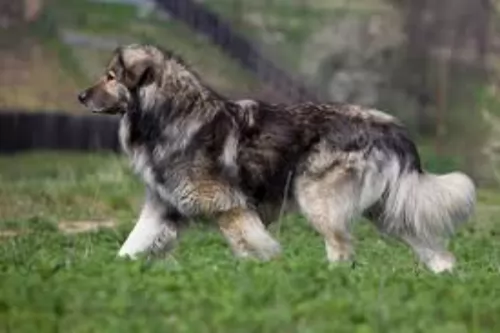 The Carpatin, known also as the Carpathian Shepherd Dog or Romanian Shepherd, is a large breed dog known for his guarding- and watch-dog abilities. Information about these dogs dates back to the 1800s, and much later, in March 1998, fans of the dog founded the Carpathian Shepherd Dogs Club.
The Carpatin, known also as the Carpathian Shepherd Dog or Romanian Shepherd, is a large breed dog known for his guarding- and watch-dog abilities. Information about these dogs dates back to the 1800s, and much later, in March 1998, fans of the dog founded the Carpathian Shepherd Dogs Club.
It is believed that the different Carpathian Shepherd Dog breeds are descendants from dogs that were developed thousands of years ago in Mesopotamia. Documentation of the origins of the dog are rare but it is thought that they are probable descendants of Lupomolossoids. However in 2005, it was finally recognized by the Federation Cynologique Internationale, and in 2006, it was recognized by the United Kennel Club. However, it is still a rare breed outside Romania.
 The Nova Scotia Duck Tolling Retriever dog was bred in the 19th-century in Nova Scotia, Eastern Canada.
The Nova Scotia Duck Tolling Retriever dog was bred in the 19th-century in Nova Scotia, Eastern Canada.
They were used as hunting dogs. Known as the ‘Toller’, the dog was at first referred to as the Little River Duck Dog but it was in 1945 that it became officially recognized by the Canadian Kennel Club as a pure breed.
The dog is a mix of retriever, setter, spaniel and possibly a farm collie mix breed. It was in 1980 that the breed gained national recognition, being declared the provincial dog of Nova Scotia in 1995.
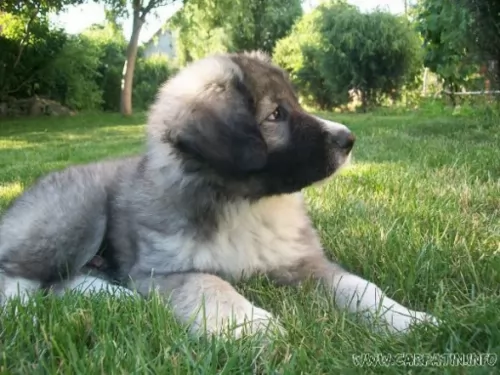 The Carpatin is a large breed dog, standing at 65 to 73cm in height and weighing between 32- and 80kg. The skull of the dog is wide and domed, the ears medium set and floppy. The neck is strong and muscled, the legs strong and straight, the chest deep.
The Carpatin is a large breed dog, standing at 65 to 73cm in height and weighing between 32- and 80kg. The skull of the dog is wide and domed, the ears medium set and floppy. The neck is strong and muscled, the legs strong and straight, the chest deep.
The tail of the Carpatin is long, bushy and high set and his coat is double layered, medium length and pale fawn in color with light grey to black shades being seen as well.
The Carpatin is patient, loving and protective. This is a strong-willed dog who is independent and fairly easy to train as he is intelligent.
It is a good idea to have him trained and socialized as this brings out the best in him. He is a patient and affectionate dog and he’ll get on well with children and tolerate other pets in the home.
They are wary of strangers and become vocal, barking and growling and taking their guard dog role seriously with strangers around.
 The Nova Scotia Duck Tolling Retriever is a medium-sized gundog. Both male and female stand at about 42 to 54cm in height and they weigh anything from 17 to 23kg.
The Nova Scotia Duck Tolling Retriever is a medium-sized gundog. Both male and female stand at about 42 to 54cm in height and they weigh anything from 17 to 23kg.
This beautiful dog is looked upon as the smallest of the retriever dogs. He has a remarkable medium-length, feathery red, copper or golden coat with some white markings and a long feathery tail with medium length, floppy ears. The coat will need brushing twice a week.
He is a powerful dog and also agile with a somewhat worried expression on his face. The expression becomes bright and animated when he is busy working and you’ll notice that the feathery tail is held high with confidence and delight when he is busy working or doing some activity he loves.
The Nova Scotia Duck Tolling Retriever is an intelligent, alert dog who is eager to please its owners.
They are affectionate dogs too, making a splendid family pet. If you’ve got kids in the home, you can trust this dog to get on well with them.
He is energetic, thriving on both physical and mental stimulation. He’ll love a walk every day as this will give him the chance to get out and sniff around. He won’t be content though with just a walk and will want ball games, walks in the park, hikes and swimming. This dog loves water and is well equipped for it with his double coat and webbed paws.
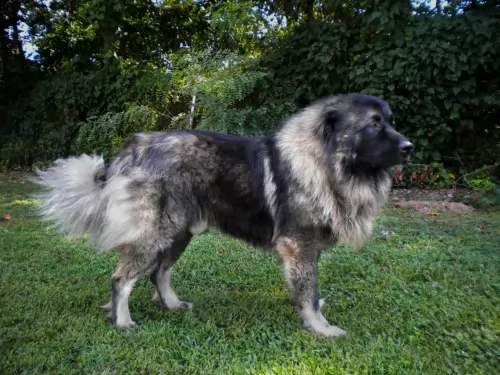 The Carpatin is a big, independent dog who loves his human family. He will guard them too and has all the intelligence and skills to be instinctively alert to danger. Territorial, he makes an excellent watchdog.
The Carpatin is a big, independent dog who loves his human family. He will guard them too and has all the intelligence and skills to be instinctively alert to danger. Territorial, he makes an excellent watchdog.
He isn’t too social around strangers, but with training and socialization he becomes more relaxed and amicable. He responds well to training, especially when he has a firm, strong handler and owner.
Used to being a herding- and working dog, he is happiest when kept busy and isn’t a dog to use essentially for guarding only as he can become aloof and aggressive. Treat him well and have him trained and socialized and you’ll have a wonderful guardian and companion.
 Your Toller is a high energy dog, and with the right family he is going to be an absolute joy to have. Give him lots of activities to stimulate him physically and mentally as he is an intelligent dog.
Your Toller is a high energy dog, and with the right family he is going to be an absolute joy to have. Give him lots of activities to stimulate him physically and mentally as he is an intelligent dog.
He is playful and social and full of life, although he is wary around strangers. Just like with most dogs, he will need training and socialization to round him off, making him obedient and well balanced.
With this good-natured pet, you will have a wonderful family friend and enthusiastic sport companion.
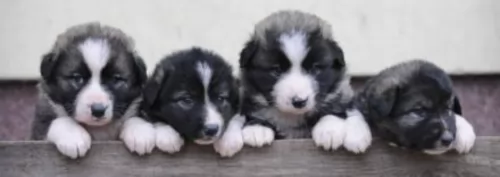 The beautiful Carpatin dog can live to be a healthy 12-14 years if you feed him nutritious foods, provide him with clean water every day, exercise him, give him a dry, warm bed and give him loads of love, attention and care.
The beautiful Carpatin dog can live to be a healthy 12-14 years if you feed him nutritious foods, provide him with clean water every day, exercise him, give him a dry, warm bed and give him loads of love, attention and care.
However every dog can become ill and with the Carpathian Shepherd Dog you certainly want to be aware of ear and eye infections, hip dysplasia and skin disorders.
 These dogs are robust, but certain genetic disorders do occur in the breed because of the smallish gene pool. Some of the biggest health problems they face are hip dysplasia and progressive retinal atrophy.
These dogs are robust, but certain genetic disorders do occur in the breed because of the smallish gene pool. Some of the biggest health problems they face are hip dysplasia and progressive retinal atrophy.
This eye disease is all about a group of degenerative eye disorders that cause blindness in both eyes of the dog.
The first symptom of this disease is night blindness where you see your dog being reluctant to go outside or to go up and down stairs in dim light. The surface of the eyes will get that cloudy, glazed-over look and as the disease progresses, you’ll find your pet bumping into things.
Mercifully it isn’t painful but you will need to get your pet to the vet to manage the condition.
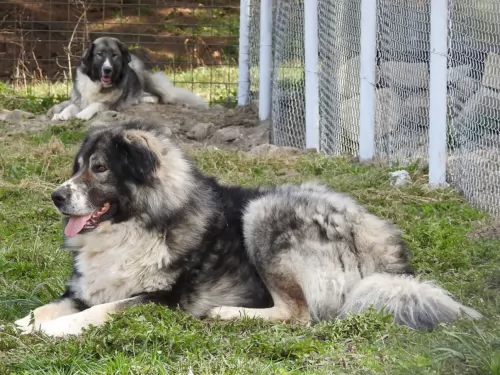 Despite his longish coat, the Carpatin is a low to moderate maintenance dog. To avoid tangles and matting, you’ll need to brush his hair at least twice a week. He won’t however require professional grooming.
Despite his longish coat, the Carpatin is a low to moderate maintenance dog. To avoid tangles and matting, you’ll need to brush his hair at least twice a week. He won’t however require professional grooming.
Dogs with floppy ears will need to have the ears checked to ensure they remain fee of moisture and wax buid-up. The ears can be easily infected when left uncleaned. The nails and teeth should also be checked. Canine toothpaste and brush can help to prevent plaque build-up which can cause gum disease and tooth decay. Not only that, dental disease can lead to other health issues in other parts of the body.
The Carpatin is a medium- to high energy level breed dog and he will therefore need a good amount of exercise to keep him healthy and content. Rope him in to your activities whether you go jogging or cycling. Put him on a leash and take him with – he’ll love it. Dogs who are allowed to be active and part of the family are simply better dogs.
Your Carpatin’s weight, age and activity levels will guide you as to what food is best for him. He needs nutritious food and if you’re unsure how to choose, your veterinarian can advise you on what to look for.
Apart from proteins, your dog needs fats, fiber, carbohydrates, minerals and vitamins. As your dog ages, he or she will go through different life stages, and you want to be sure of ensuring your dog is getting everything he needs to ward of disease and stay happy and healthy.
Make sure your 4-legged canine friend always has a bowl of fresh, cool water available to him.
 Tollers are energetic dogs and you won’t have to extend a second invitation to this dog to join you on your walks, hikes, hunting and swimming. It is perhaps why he is better suited to country living as opposed to living in the city.
Tollers are energetic dogs and you won’t have to extend a second invitation to this dog to join you on your walks, hikes, hunting and swimming. It is perhaps why he is better suited to country living as opposed to living in the city.
You want to ensure the best food for your four-legged friend, but the idea is to keep things simple and nutritious for your dog.
Your pet can’t tell you when he’s got a stomach-ache from eating the wrong foods so you have to be careful what you feed him. You want to make sure that the food you give your dog is balanced for the stage of life he or she is in – puppy, young adult, pregnancy, ill dog or senior dog.
You’ve also got to see whether your dog is small or large, active or a couch-potato type of dog, and choose commercially manufactured foods that cater for the kind of dog he is.
It is fine to feed your dog a kibble food or you can mix in some chopped up boiled chicken, brown rice or pasta and some vegetables such as carrots, sweet potatoes and spinach. Some raw meat added in when you can afford it, will also do your pet the world of good.
You can see from this diet, it is uncomplicated, plain, wholesome food and will do your pet good.
Always be careful of bones with your dog and speak to your vet first before you opt to give your dog bones.
Never leave your pet without a constant supply of fresh, cool water.
Both dogs and owners benefit when a dog has been trained and socialized. The dog is balanced and obedient and a stronger relationship develops between owner and dog because of the dog being well behaved. The Nova Scotia Duck-Tolling Retriever is an intelligent dog so he won’t have any trouble with training.